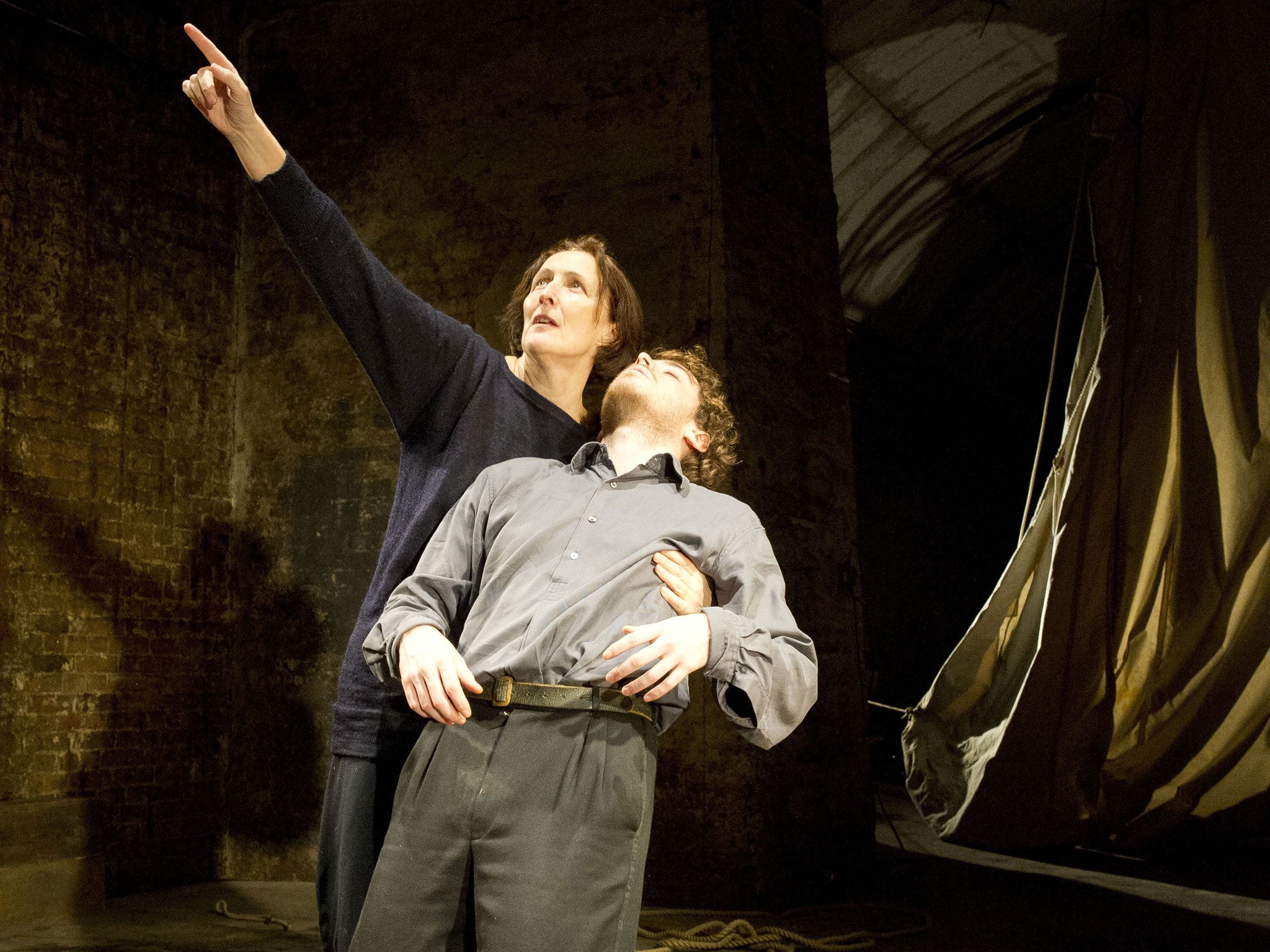IoS theatre review: The Rime of the Ancient Mariner, Old Vic Tunnels, London So Great a Crime, Finborough, London Fiesco, New Diorama, London
Fiona Shaw leads her audience a surprisingly merry dance to Coleridge's bleak epic poem

The dead sailors stood on the deck and fixed him with a baleful stare. They were a ghoulish crew, fit for a "charnel-dungeon". So says the old seafarer as – haunted by guilt and superstition – he relates how he doomed all aboard the vessel when he killed an innocent albatross that hovered overhead.
If you're looking to stage Coleridge's narrative poem The Rime of the Ancient Mariner, the Old Vic Tunnels are certainly going to enhance its sepulchral allusions. A vast brick catacomb stretches into the distance as Fiona Shaw (in navy jumper and plimsolls) paces to and fro, reciting the ballad. She is accompanied by a silent, sometimes whirling, sometimes writhing dancer (Daniel Hay-Gordon, choreographed by Kim Brandstrup). Their shadows loom large on the sidewalls, caught in circular spotlights like full moons.
What's impressive is how Phyllida Lloyd's production invigorates The Rime. This 144-stanza saga about a purgatorial voyage through frozen seas and drought-stricken delirium can lapse at points, on the page. Amid mesmerising passages are couplets that veer close to doggerel, scattered with folksy archaisms. (The poet himself, unsatisfied, kept tinkering after mixed reviews in 1798.)
Shaw, however, manages to conceal such flaws, delivering Coleridge's verses with a gusto that feels natural, at once vibrant and relaxed. At the dark centre of the poem, she portrays the ancient mariner reliving the trip's Gothic horrors with startling intensity, red-eyed with grief. Occasionally, she finds veins of humour too, notably near the close, alleviating what might otherwise have come over as an obtrusively Christian ending –when the mariner begs to be shriven by a hermit. These days, the moral has acquired an environmental tinge: "He prayeth well, who loveth well/ Both man and bird and beast."
Here and there, the actor-dancer double act is slightly awkward, but more often Shaw and Hay-Gordon's fluid identities keep you on your toes. They not only role-switch as the storyteller and his unwillingly hooked auditor (waylaid en route to a wedding), they also play each others' tortured souls or comforting thoughts expressionistically. A simple wooden staff serves as the albatross, the symbolic burden of guilt. It is yoked under Hay-Gordon's arms like the bar of a crucifix as, Pietà-style, he lies felled in Shaw's lap. Let's hope this production returns for a longer run soon.
"How can history judge fairly?" asks Vikram de Saram, a friend of the accused, in So Great a Crime, a new biodrama about Major General Hector MacDonald. A British war hero, knighted by Queen Victoria, his celebrity turned to notoriety in 1903 when he was accused of luring young boys into sexual relations. He shot himself en route to the court-martial in colonial Ceylon.
The case, inevitably, has topical reverberations, given the Jimmy Savile scandal, the peer wrongly accused of child abuse, and Operation Yewtree.
We will never know the truth, concludes De Saram. Yet the overriding impression is that writer-director David Gooderson is presenting the case for the defence. He shows us the snobbish English Establishment, galled by the low-born Scot, conducting a smear campaign and bribing local boys to denounce him. As I understand it, opinion is still divided among historians as to whether or not that happened.
So Great a Crime would be more intriguing if the audience were left in more doubt and if Stuart McGugan's stolid MacDonald had some moments of ambivalence, rather than seeming almost unquestionably decent.
A framing device, whereby troopers escorting the disgraced man's coffin on a train to Scotland start acting out his life, doesn't much help. It barely hangs together, the soldiers' individual views on MacDonald's reputation not even tallying with the roles they assume in his story. All in all, this ain't so great a play.
The rape of a woman is what sparks a revolution in Fiesco. This rarely aired political drama, penned by Friedrich Schiller in 1782, is set in 16th-century Genoa, where a delinquent prince and tyrant in the making, Gianettino, brutally deflowers the daughter of an avid republican. A clutch of senators then conspire to overthrow Gianettino, who's a murderous schemer to boot.
They want eloquent Count Fiesco on side, but can they trust him? He appears to have become a debauched playboy himself. Moreover, if he leads the putsch, might he turn megalomaniac?
One cannot but admire Schiller's ambition, but rife with plots and counterplots, Fiesco's storyline involves more twists than a cat's cradle and too many nods to Shakespeare.
I take my hat off to the New Diorama's resident company, the Faction, for its courage in tackling this piece in rep. On a bare, black stage and a tiny budget, it gets a modern-dress production with crowds dancing then rioting in slow-motion. But there's no sharp sociopolitical tallying of past and present by director Mark Leipacher. The acting lacks psychological subtlety, generally just upping the volume to impart urgency. Let's hope someone will realise this play's full potential soon.
'The Rime of the Ancient Mariner' (020-7922 2922) today only; 'So Great a Crime' (0844 847 1652) to 22 Jan; 'Fiesco' (020-7383 9034) to 23 Feb
Critic's Choice
In the Republic of Happiness, Martin Crimp's satirico-absurdist vision of dysfunctional families and cults, is darkly gripping. It's at London's Royal Court (to 19 Jan). Meanwhile,White Rabbit, Red Rabbit is a radically experimental piece about Iran, performed by someone different every night. On Saturday 19 January it'll be Ken Loach on stage at the Old Vic Studio in Bristol.
Join our commenting forum
Join thought-provoking conversations, follow other Independent readers and see their replies
Comments